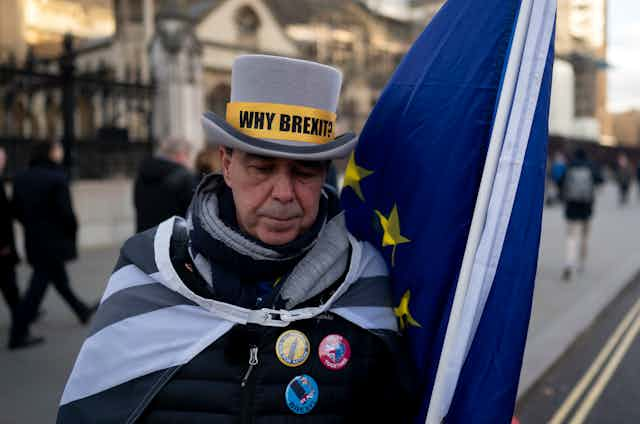The EU referendum emphasised a divide in UK politics between two competing identities. People now identify as Remain and Leave more readily than as having a party political identity. But, as the UK finally exits the European Union on January 31, some 1,317 days after the EU referendum of 2016, what happens to these identities?
It’s worth thinking about what we mean by identity. Previously I’ve defined it, briefly, as being the image an actor has of themselves, made up of elements called “roles”. Both during and after the referendum campaign, being a Leave or Remain voter came to perform a dominant role in a great many people’s political identities.
Identities and roles are inherently social things. They are performed around other people and informed by their behaviour. Whether or not the identities we assume are appropriate is also decided by those factors. If we assume an identity that others do not think appropriate – say, by dressing as a clown when we work as a doctor – then others will react accordingly.
Now that Leavers no longer need to fight to secure Brexit and Remainers can no longer stop it, there are a host of possible scenarios. These identities might just fade away. They might, however, become stronger for one group, or both.
We already know that Leave and Remain voters have extremely divergent views on how Brexit will affect them personally and the country at large. We also know that these roles of being Leave or Remain influence how those voters view the same facts on things like economic performance.
What this initially suggests is that the same event – the UK leaving the EU – will be interpreted differently by those two types of voter. It also suggests that what follows during negotiations with the EU about the future, will be viewed differently too.
We also know that these two blocs of voters have been divided for some time over the cultural and economic direction being taken by the UK as a whole. In this sense, Leave and Remain are roles that people moved into, at least in part because of a wider identity that found expression through the question of EU membership, rather than necessarily being created by the referendum.
Together, all these points indicate an enduring divide, between two roughly equally sized and powerful identities.
Coming back together?
The UK’s impending trade deals with the EU and other states could play a surprisingly significant part in the future of Leave and Remain identities. All trade deals require a trade off between sovereignty and access – the more access you get, the less control you have over your own trade and economic policy. These two notions are key to the Leave and Remain identities in the UK. The choice between sovereignty and access will drive how the deal is seen. Either the UK will be giving too much control away, or not permitting enough access; or possibly both.
It may be possible that striking a fine balance between these options is enough to soothe both side’s concerns. Or it may be that both sets of voters view the compromise as surrendering too much to the other side. Either way, the decision will have implications for how important these two Leave and Remain roles are to their respective groups of voters.

Former prime minister Theresa May’s deal arguably failed because it simply didn’t appeal to either of the strongest ends of the identity poles in British politics. For Remainers, it was too Brexit, and for Leavers, it was not Brexit enough.
Her successor, Boris Johnson, overcame that by increasing the Leave attraction of his offer, without losing too many Remainers from the other side. While he didn’t inspire enthusiasm among the latter group, he avoided alienating enough of them to thwart his plan.
The risk now for the government is that this strategy stops paying off, jeopardising the potential for unity. Johnson has repeatedly expressed the desire to avoid that, to bring the country together and move forwards.
While he alone cannot make that happen, the choices he makes – both materially and rhetorically – about the UK’s future relationship with the EU will be the next great unknown variable that will shape whether or not that unity comes to pass.
There is a risk, based on past behaviour, that the way the government behaves during the trade negotiations intensifies a message to Remain voters that its world view is alien to their values and interests, ensuring that the split continues. A government that was seen as too accepting of strident Leave views, that put too low an emphasis on free trade with Europe, or that failed to articulate policies in terms that resonated with the Remain role would find itself unable to bridge that gap.
Failure to erode the divide between Leave and Remain will ensure UK politics remains deeply fractious for some time to come. Success may at least lower the temperature and create space for other conversations.

